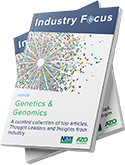Home » Health News »
SynGAP Research Fund awards $180,000 grant to the University of Edinburgh Medical School's Patrick Wild Centre & Centre for Discovery Brain Sciences
SynGAP Research Fund (SRF), a 501(c)(3) public charity whose mission is to improve the quality of life for SYNGAP1 patients through the research and development of treatments, therapies and support systems, along with SynGAP Research Fund UK, today announced they have awarded a $180,000 grant to the University of Edinburgh Medical School's Patrick Wild Centre & Centre for Discovery Brain Sciences to advance the science around gene transfer to correct SYNGAP1 haploinsufficiency.
In pilot studies, principal investigators Stuart Cobb (Simons Fellow and Professor in Translational Neuroscience) and Peter Kind (Director of the Patrick Wild Centre for Research into Autism, Fragile X Syndrome (FXS) and Intellectual Disability and Professor of Developmental Neuroscience) have assessed a range of gene therapy cassettes and identified a construct that, when packaged in AAV9 (a gene vector), demonstrated the ability of gene transfer to target a dominant isoform of SynGAP protein to synaptic compartments at pseudo-physiological levels. The aim of the program to advance the research into dose-defining efficacy, biodistribution and tolerability studies.
While the scale of SYNGAP1 is still being quantified, we do know that large-scale exome sequencing studies indicate it is one of the most prevalent recurring genes, accounting for as many as 0.5-1% of individuals with neurodevelopmental disorders. We are at the tip of the iceberg in terms of the number of people officially diagnosed with this disease. We need to run – not walk – to find therapies and treatments that can improve the quality of life for those diagnosed. The work being done by Drs. Cobb and Kind is critical to advancing these efforts."
Michael Graglia, Managing Director of SRF
The project
Genetics & Genomics eBook

The two-phase project aims to assess the effectiveness of the SYNGAP1 vector in rats modeling the disorder. In Phase I, the team will run experiments to establish the transduction efficiency and tissue bio-distribution of AAV9/SYNGAP1 in brain regions after intracerebroventricular injection of vector in wild type rats. During Phase II, they will test the therapeutic benefit of ICV delivery of AAV9/ hSYNGAP1 in male SYNGAP1 +/- male rats in terms of key neurological and behavioral phenotypes.
The goal of the two-year project is to generate proof-of-concept efficacy and non-GLP safety data that would support a potential future IND submission for a SYNGAP1 gene therapy.
"Our kids struggle daily as a result of their SYNGAP1 symptoms – and they often get worse as they get older," said Julie Pender, co-chair of SRF UK. "Advancements in gene therapy are so incredibly promising and give us all hope that one day we will be able to improve the quality of life for everyone with a SYNGAP1 diagnosis. The work being done by the University of Edinburgh gets us closer to that future, and I'm so pleased we can help further their research."
Stuart Cobb, Simons Fellow and Professor in Translational Neuroscience, added: "Peter and I are excited to be working with the SynGAP Research Fund to advance the development of a gene therapy to help individuals with Syngap1 syndrome. We have a highly motivated team that is committed to moving quickly to take this work to the next stage."
About SYNGAP1
SYNGAP1-related intellectual disability (ICD-10 F78.A1) is a rare genetic disorder caused by a variant on the SYNGAP1 gene, which is located on Chromosome 6 and responsible for producing the SynGAP protein. This protein acts as a regulator in the synapses (where neurons communicate with each other). A variant of the SYNGAP1 gene leads to the gene not producing enough SynGAP protein; without the right amount, we see an increase in excitability in the synapses making it difficult for neurons to communicate effectively. This leads to many neurological issues seen in SynGAP patients.
Symptoms of SYNGAP1 include: Intellectual Disability; Epilepsy; Hypotonia (low muscle tone); Gross and Fine motor skill delays; Autism Spectrum Disorder; Gastro-intestinal disorders; Sleep and Behavior disorders and Visual Abnormalities.
Syngap Research Fund
Posted in: Medical Science News | Medical Condition News
Tags: Autism, Brain, Charity, Chromosome, Chromosome 6, Disability, Efficacy, Epilepsy, Exome Sequencing, Fragile X Syndrome, Gene, Gene Therapy, Gene Transfer, Genes, Genetic, Genetic Disorder, Hypotonia, Medical School, Medicine, Muscle, Neurons, Neuroscience, Protein, Research, Sleep, Syndrome
Source: Read Full Article



